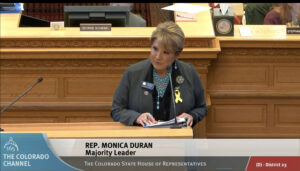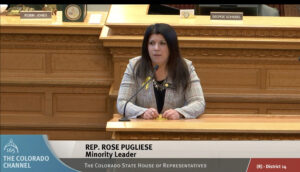Colorado House Democrats pushed through a rule change Friday that could limit debates on certain motions at the end of each legislative session — a time when some of the most contentious business-focused bills could be up for debate.
On a fully partisan vote, the House approved a resolution that allows leaders to trigger end-of-session rules beginning on the 110th day of each 120-day regular session and throughout special sessions, rather than just with three days to go, which is current practice. House Resolution 1004 also requires that members asking for bills to be read at length remain in the chamber during the bill reading, and it permits the majority leader to seek a vote to delay debate for another day or time after at-length bill reading has been requested.
While Republicans have increasingly asked for bills to be read at length as a filibuster tactic designed to force compromise from Democrats, it’s the extension of end-of-session rules that bothers GOP members the most and is likely to have the biggest impact.
Invoking such rules lets the majority party limit debate and force immediate votes on four motions — third-reading amendments, motions for reconsideration, committee reports and Senate amendments to House bills. And it’s the last of those four motions that tend to engender lengthy late-session debates, as exemplified by the chaos that erupted at the end of the 2023 legislative session.
Echoes of 2023 disputes over debate
With just eight days left, Democrats introduced a bill to put Proposition HH — the ultimately failed initiative that sought property-tax-assessment reductions in exchange for a lifting of the Taxpayer’s Bill of Rights revenue cap — and five days later they introduced a companion bill to change the way TABOR refunds were distributed. When it seemed House Republicans could run out the clock on the final day of the session by debating changes made in the Senate, Democrats invoked end-of-session rules to cut off debate and the GOP walked out of the House in protest.

Colorado House Majority Leader Monica Duran speaks Friday on the House floor about HR 1004.
In introducing HR 1004 on Friday, House Majority Leader Monica Duran, D-Wheat Ridge, called it “an important resolution to help promote the respectful and effective operations of the House.” While voters sent legislators to the Capitol to debate important topics, the constitutional allowance for requiring bills be read at length has “primarily become a delay tactic designed to stop policies that the majority of Coloradans support,” Duran said.
“We are here to do the work our constituents sent us to do, which demands that we engage in respectful, meaningful conversation and debate,” Duran said. “The reason this is important is that it is essential to get our work done and to deliver for Coloradans.”
End-of-session rules
While Duran focused more time on the rules around reading bills at length, which mirror Senate rules passed in 2022 and allow a requester to leave the chamber for as long as five minutes for a bathroom break, Republicans focused on the end-of-session rules.
House Minority Leader Rose Pugliese — a Colorado Springs Republican elected one week ago to lead her caucus following the resignation of former minority leader Mike Lynch from his position — said that limiting debate silences the voices of minority legislators. And extending those limits from their traditional three-day period to a week-and-a-half period when many important bills will be debated effectively will limit their ability to represent constituents with different viewpoints from the majority party.
“We will not stand for it. We place our objections on the record today, and we will continue to place our objections,” Pugliese said. “We also believe in the constitution. We believe in our right to be heard and our right to represent people and our right to advocate for the positions that we feel are important — and also our right to make bills better.”

Colorado House Minority Leader Rose Pugliese speaks Friday on the House floor about HR 1004.
While Pugliese said it was not a partisan issue, HR 1004 passed 42-19, with all Democrats present voting for it, all Republicans present voting against it and four Democrats excused.
What it could mean to business debate in 2024
While the end-of-session rules were used to curtail some debate about the issue of property taxation last year, it remains to be seen what issues will be in play in early May this year — or how the expanded end-of-session rules may affect them.
While Gov. Jared Polis and Democratic leaders have begun to roll out some priority bills on affordable housing already — advancing a measure to bar cities from limiting the number of unrelated residents in a home and introducing a measure to allow urban property owners statewide to build accessory dwelling units — some key bills haven’t arrived yet. That is notable because an omnibus land-use reform bill died on the final day of the 2023 session when dueling sides ran out of time to find a compromise, and a coming bill to demand greater density in transit-oriented communities likely will rile much discussion.
Also, Democrats haven’t yet introduced most of the significant environmental or workplace-regulation measures that will stir up lengthy debate, meaning some of those are likely to extend into the final 10 days of the session. Members of an interim committee that studied ozone pollution are expected to introduce proposals, for example, to boost requirements around air-quality permitting that are likely to lead to major clashes with the business and oil/gas communities and potentially with members of Polis’ administration.
